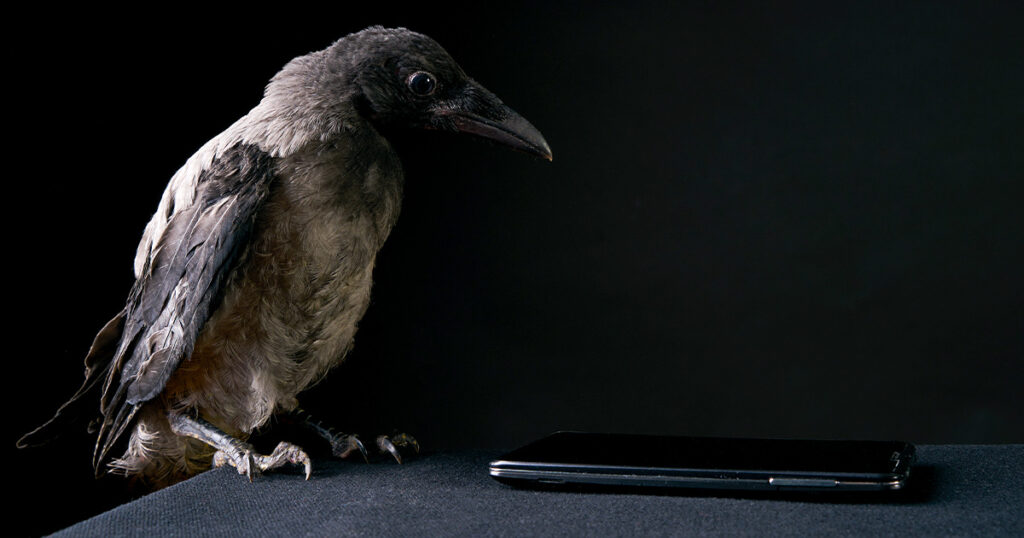
It has become increasingly evident to scientists that the intellectual prowess of your average crow has been roundly underestimated. With remarkable skills including superior social acumen, analogical thinking and the ability to craft and use tools, crows seem to prove themselves more and more clever with every investigation into the inner workings of their small, but mighty, brains.
Recently, new research revealed that crows may be capable of recursive thinking. Recursion can be described as the process of defining something in terms of itself. Humans use recursion in mathematics and language, and it’s a hallmark feature of advanced linguistic ability, as originally posited by Noam Chomsky in his hierarchy of grammars. Recursion in language is used to grow the complexity of sentence structure to contain, in theory, an infinite number of embedded elements or ideas. Put simply, linguistic recursion refers to the nesting of one grammatical structure, this sentence for example, within another of the same kind. Formerly thought to be a skill exclusive to primates, research like that recently published in Science Advances has challenged this assumption.
This work, conducted at the University of Tübingen in Germany, drew inspiration from another study published in 2020 that measured how well four groups— including adults from the U.S., adults from an indigenous tribe in Bolivia, children aged 3 and 4 and rhesus monkeys—could recognize and subsequently produce recursive sequences. Researchers used nested pairs of colored brackets to represent basic recursive structures. Each group was shown a display with two pairs of brackets, such as [] and {}, with individual brackets appearing in random order. Participants were rewarded when they touched the brackets in a recursive, or “center-embedded”, sequence, for instance { [ ] }, or [ { } ], versus a non-recursive sequence such as { [ } ]. Researchers then presented participants with a completely novel set of brackets to observe whether they would arrange these new brackets in a recursive way. Though the monkeys required additional training, all groups were able to successfully complete this test, demonstrating that primates across species could produce recursive sequences based on the stimuli provided.
Researchers in Germany followed a similar protocol to examine recursive thinking in crows. Two crows were trained to peck bracket symbols appearing in recursive sequences and were subsequently prompted to generate such sequences with a new set of symbols. The crows not only outperformed the monkeys but were as adept at creating recursive sequences as children. To bolster their findings and address the possibility that the crows were arriving at the right sequences using strategies other than recursion, researchers expanded on the original study to deepen the complexity of the embedded structures by adding an additional pair of brackets to the sequence. In this case, a center-embedded sequence of brackets would appear as such: { [ ( ) ] }. Though this did impact their performance somewhat, the crows still produced recursive sequences significantly more often than would be expected by chance.
Though perhaps not sufficiently rigorous to be conclusive, this study certainly raises some interesting questions on the evolution of cognition and communication. Worth considering are the alternative pathways through which these birds could have arrived at what may appear to be recursion but might be something simpler, such as a basic ordinal strategy or associative learning mechanisms. Recursive thinking and the role it plays in setting humans apart from other animals is also debated among linguists. Still, studies like this one can bring us one step closer to understanding just how smart crows really are.
References:
Crows Perform Yet Another Skill Once Thought Distinctively Human – Scientific American
Latest posts by AnnaKay Kruger (see all)
- Elephants May Call Each Other By Name - July 16, 2024
- Studying Episodic Memory through Food-Caching Behavior in Birds - April 16, 2024
- A Silent Killer: Tracking the Spread of Xylella fastidiosa - March 27, 2024
